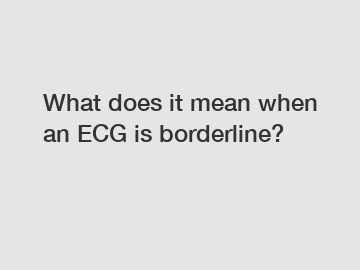What does it mean when an ECG is borderline?
Electrocardiogram (ECG) is a valuable diagnostic tool used to analyze the electrical activity of the heart. It provides crucial insights into a person's cardiovascular health by measuring the heart's rhythm and detecting any irregularities. But what if your ECG results show that they are borderline? Don't panic! In this blog post, we will demystify what it means when an ECG is borderline, giving you a clearer understanding of this ambiguous diagnosis.
What is a Borderline ECG?
A borderline ECG suggests that certain aspects of the results lie between what is considered normal and abnormal. It can be perplexing for both patients and healthcare professionals, as it does not clearly indicate an issue or provide a definitive diagnosis. Instead, it highlights a need for further investigation and monitoring to determine if there is an underlying cardiac condition.

Causes of Borderline ECG:
It's important to note that a borderline ECG does not necessarily indicate an abnormality or disease. Several factors can influence these borderline results, including:
1. Body Composition: Individuals with a larger chest or muscular build may have ECG readings that fall within borderline ranges due to their unique anatomical structure. The thickness of chest muscles can affect the electrical signals picked up by the ECG leads, leading to slight variations.
2. Technical Issues: Sometimes, borderline ECG results can be a result of technical errors during the procedure, such as poor electrode placement or interference from electrical devices. These issues can lead to inaccuracies in the captured electrical signals, causing the results to be borderline.
3. Lifestyle Factors: Certain lifestyle choices and conditions can also impact ECG readings. Factors such as smoking, excessive caffeine intake, stress, anxiety, and certain medications can influence the electrical activity of the heart, potentially resulting in borderline ECG results.
Understanding the Interpretation:
When an ECG is deemed borderline, further assessment becomes crucial. Additional tests, such as exercise stress tests, echocardiograms, or Holter monitoring, are often recommended to gain a comprehensive perspective on heart function. These tests provide a more detailed analysis, allowing healthcare professionals to differentiate between benign borderline findings and potentially serious cardiac issues.
Consulting a Cardiologist:
Upon receiving borderline ECG results, a referral to a cardiologist is usually warranted. Cardiologists are the experts who specialize in diagnosing and treating heart conditions. They possess the necessary expertise to interpret the findings accurately and recommend the most appropriate course of action, whether it involves further testing, lifestyle modifications, or follow-up examinations.
The Importance of Regular Check-ups:
Routine check-ups with your primary care physician or cardiologist play a vital role in comprehensively assessing your cardiac health. By conducting regular ECGs, your doctor can track any changes over time, helping differentiate between fluctuations due to lifestyle factors and those indicating potential cardiac issues.
Conclusion:
A borderline ECG can cause understandable concern, but it does not automatically translate into a diagnosis of a heart condition. Instead, it suggests the need for further evaluation to ensure accuracy and appropriately assess your cardiovascular health. Remember, interpreting ECG results requires medical expertise and professional evaluation. Trust the guidance of qualified healthcare professionals who can provide a clear understanding of your unique situation and recommend the best course of action. Regular check-ups and open communication with your healthcare provider remain keys to maintaining cardiac wellness.
For more ecg/sp02/smart tracker, health smart watch for seniors , smart health watchinformation, please contact us. We will provide professional answers.

Comments
0